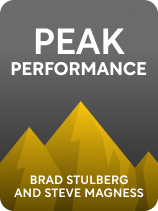

This article is an excerpt from the Shortform book guide to "Peak Performance" by Brad Stulberg and Steve Magness. Shortform has the world's best summaries and analyses of books you should be reading.
Like this article? Sign up for a free trial here.
What’s the importance of purpose in life? How does a purpose maximize human performance?
In Peak Performance, Brad Stulberg and Steve Magness argue that purpose is crucial for exceeding our limits. They contend that having a purpose that goes beyond our interests is essential to maximizing performance because such purposes help us overcome our perceived psychological limitations.
Let’s look at why everyone should have a purpose they strive to achieve.
The Importance of Purpose
To understand the importance of purpose in life, Stulberg and Magness explain that physical fatigue lies not only in our bodies, but also in our minds. To show as much, they cite an experiment that asked weightlifters to perform leg exercises until physical exhaustion—the point at which they could no longer lift. Researchers then ran an electric current through their legs and found that their leg muscles could still contract, suggesting they weren’t truly depleted, even though the weightlifters believed they were.
(Shortform note: Researchers have found that because our mind plays a role in our perception of fatigue, mental fatigue itself can cause decreased physical performance. In particular, researchers found that individuals suffering from mental fatigue reported increased levels of exertion during physical exercise, which in turn caused their overall performance to suffer.)
Because fatigue lies partially in our minds, it stands to reason that if we could shift our perception of fatigue during stress, we could increase our performance. And, Stulberg and Magness report, one study suggests we can do just that. In this study, researchers scanned the brains of participants who were exposed to threats, asking one group to think about their core values beforehand. Those who thought about their values displayed brain activity showing that they perceived the threats positively. In other words, reflecting on their values allowed them to shift the brain’s perception of threats.
(Shortform note: In a similar vein, researchers have found that the practice of mindfulness can increase pain tolerance by causing us to dissociate from the painful experience. In one study, researchers applied painful heat to the skin of two groups of individuals, the first being a control group and the second being a group who had performed four mindfulness sessions. They found that this latter group reported a 32% reduction in pain relative to the former group, despite still being relative novices at mindfulness meditation.)
For this reason, Stulberg and Magness note that individuals with stronger senses of purpose performed better at their jobs. For example, one study of hospital janitors found that janitors who believed their job was crucial for helping patients heal performed better and were more satisfied than those who lacked this sense of purpose. Further, in a separate meta-analysis of over 200,000 employees, scientists found a significant positive association between increased job performance and employees’ belief that their job positively impacted others.
(Shortform note: A strong sense of purpose can also be crucial in life-or-death situations, according to Holocaust survivor Victor Frankl. In Man’s Search for Meaning, Frankl recounts his own observations from concentration camps, in which he found that individuals oriented toward some greater purpose were more likely to survive than those who lacked such a purpose. According to Frankl, such individuals were less likely to succumb to despair and resignation, instead surviving at all costs to pursue their purpose.)
How to Find Your Purpose
Having highlighted the importance of purpose, Stulberg and Magness explain that you can find your purpose by identifying your core values and distilling them into a purpose statement.
Your core values, Stulberg and Magness explain, are values that are most central to your identity. To outline your core values, they recommend reflecting on the five values that are most important to you—for example, you might decide that education, relationship, spirituality, positivity, and loyalty are essential to who you are as a person. Afterward, they advise you to write a sentence or two about each of these values and rank them in terms of importance. For instance, you might conclude that deep relationship is your defining value and write “I hope to deepen my understanding of and empathy for people by cultivating vulnerable, lasting relationships.”
Stulberg and Magness write that the final step after writing these sentences is incorporating them into a coherent purpose statement—a declaration of your perceived purpose that reflects the values you previously selected. Because this process is so individualized, Stulberg and Magness provide no concrete tips for crafting your own purpose statement. However, a sample purpose statement for the previous set of values might look like this for a teacher: My purpose is to form lasting relationships with my students so that the process of education can extend beyond the mind and into the heart.
Victor Frankl’s Three Paths to Meaning
For those who aren’t sure of their core values, Frankl’s proposed paths to meaning in Man’s Search for Meaning can be helpful. Frankl, a Holocaust survivor and psychologist responsible for developing logotherapy—a school of therapy that emphasizes the importance of purpose for enduring hardship—explains that most people find their meaning via three paths:
- Path #1: Action. Frankl points out that many find their purpose through the actions that they perform, such as an artist discovering meaning through her paintings.
- Path #2: Love. Frankl explains that love, whether platonic or romantic, is another common means of finding one’s purpose. For example, parents might find meaning because of their overwhelming love for their children.
- Path #3: Suffering. Frankl contends that suffering can be an additional means to finding purpose. For instance, children who have suffered in foster care might later find purpose as social workers aiding children in similar circumstances.
Nonetheless, Frankl acknowledges that the world is rife with obstacles to finding meaning. For example, many people succumb to nihilism, the belief that life has no greater meaning, and others may feel disillusioned by the inevitability of death. To mitigate these philosophical challenges, Frankl recommends that you prioritize concrete action over abstract thinking, since concrete action can reorient you toward your purpose and pre-empt nihilistic thoughts.

———End of Preview———
Like what you just read? Read the rest of the world's best book summary and analysis of Brad Stulberg and Steve Magness's "Peak Performance" at Shortform.
Here's what you'll find in our full Peak Performance summary:
- That the quest for excellence leaves us suffering from exhaustion and burnout
- Why cycles of stress and rest are necessary for sustainable elite performance
- How to develop a consistent routine and structure your time






